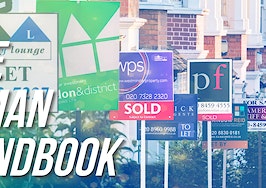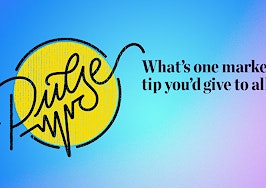 September is Marketing and Branding Month at Inman. That means we’re talking to the chief marketing officers at major brokerages about how the pandemic is changing their jobs and what it means for agents. We’re publishing a suite of tactical Inman Handbooks for marketing on digital portals. And we’re looking at what pages of the traditional marketing playbook still work. Join us all month long.
September is Marketing and Branding Month at Inman. That means we’re talking to the chief marketing officers at major brokerages about how the pandemic is changing their jobs and what it means for agents. We’re publishing a suite of tactical Inman Handbooks for marketing on digital portals. And we’re looking at what pages of the traditional marketing playbook still work. Join us all month long.
Almost everyone in the property industry had to adjust their marketing in 2020. We’re all moving quickly to adapt to the pandemic, economic challenges, unprecedented swings in some submarkets and buyer demand volatility.
The stress is incredibly hard on real estate agents. Here, I will share a few lessons from some of the world’s best agents about the different ways you can adapt, tweak and change your marketing this year.
1. Learn to stage model residences for a virtual world
When more people are consuming your property videos and virtual tours, staging becomes even more important than before. You can’t do virtual showings with empty residences, but staging for the virtual world is different than staging for an in-person walkthrough.

Daniel August Cordeiro
For example, in interactive 3D virtual walkthroughs, the importance of the view is paramount. Users always navigate toward the window as soon as they virtually enter the residence. You want to make sure it’s clear of furniture and window treatments. That isn’t the case when staging for in-person showings and interior design photography.
Additionally, when staging for virtual assets, knickknacks and tchotchkes aren’t needed. For in-person staging, we accessorize so the unit feels like a real home, with fully-stocked bookshelves, fresh flowers and art everywhere. Virtually, you don’t need to rely on that. You just need the big items to give the residence scale.
Removing art will reduce your expenses because art is one of the biggest staging budget-takers. For a new development in Manhattan, depending on the property’s caliber, staging can cost anywhere from $75,000 to over a million dollars. When staging, if you do something extraordinary, you can also try to get media coverage, say in Architectural Digest or Dezeen. – Daniel August Cordeiro, Corcoran Sunshine, New York City
2. Don’t shy away from online live events

Lily Chong
Online live events can do more than generate leads for the specific property you are marketing. Yesterday, I sold two units to a local investor who had seen one of our online events last month. That gave us credibility in his eyes, and the properties he bought are in a different project than the one that had been promoted.
Instead of sitting in an office and giving an online PowerPoint presentation, I would rather broadcast live from the site via software like Zoom. Let people see the real thing.
Help connect buyers with the data and consultants they need. Let’s say they are looking for a loan; I will bring a mortgage specialist into the online chat. I will stay there with the client to ensure they are satisfied because most people don’t want to talk to another stranger. – Lily Chong, IQI Perth, Australia

Chad Creech
3. Make things easy
We should always try to make our clients’ experience as easy as possible, and it’s even more important today. The first thing a client notices about me is how little I talk about myself. I ask them questions, so I know how to serve them best. The experience is about them. It’s not about me.
In 2020, your communication needs to be more verbal and visual and less email. You can’t always do face-to-face [meetings], but you can have more phone conversations and video chats than emails. An actual discussion generates a connection, is more personal, and is more professional.
Anybody can type an email, but not everyone can have a productive phone call with someone. In a discussion, remember that not everybody has gone through the buying process, or if they did, it may have been ten years ago. If you use an industry word, make sure to explain what it is. – Chad Creech, Engel & Völkers Orlando Winter Park, Florida
4. Remember in-person showings

Denise Bodman
Everybody has a different opinion about the world we are living in right now. Not all of them want to view property virtually. I ask if someone is interested in an in-person or a virtual tour. In my market, most still want to be there in person.
Even so, it’s essential to take precautions. We have adopted new virtual marketing ideas and strategies while not overlooking in-person showings. Buyers need to know that you have safety measures in place. We have some branded face masks on order that we will use as a promotional gift. Allowing people to feel as normal as possible helps them feel comfortable in the sales process. – Denise Bodman, Prospect Real Estate, Austin, Texas
5. Look for new tools and opportunities
This year is unprecedented, so get out of the norm. Don’t be static. Always ask yourself how to set yourself apart. It’s like constantly trying to reinvent the wheel. Talking about tools, we were using Top Producer but have switched to Trello.

Amy Leong
Trello is like a Pinterest board on steroids for organizing your sales funnel. It’s very interactive. It’s not boring. For opportunity, we have focused on renters. Renters are one of the biggest demographics left untouched by many Realtors.
Interest rates are so low. I can’t even tell you how many renters I’ve helped buy property for the same monthly expense. They had the savings but had no one to show them how to do it. Who can you target that is a stone still left unturned? – Amy Leong, Engel & Völkers, Vancouver, Canada
After applying the above five marketing tactics from world-class agents, consider this if you want to make further improvements. Except for those born into it, the most successful people generally got that way through their habits and practices they embrace daily.
If you are not already the top agent in your market, then look around to find out who it is. Who lists the most, sells the most or rents the most? Apply the marketing practices you learn from them to your own business. Turn these people into your personal MBA program. The best part? It’s free.
Georg Chmiel is Executive Chairman of Juwai.com and Chairman of ASX-listed iCar Asia.













